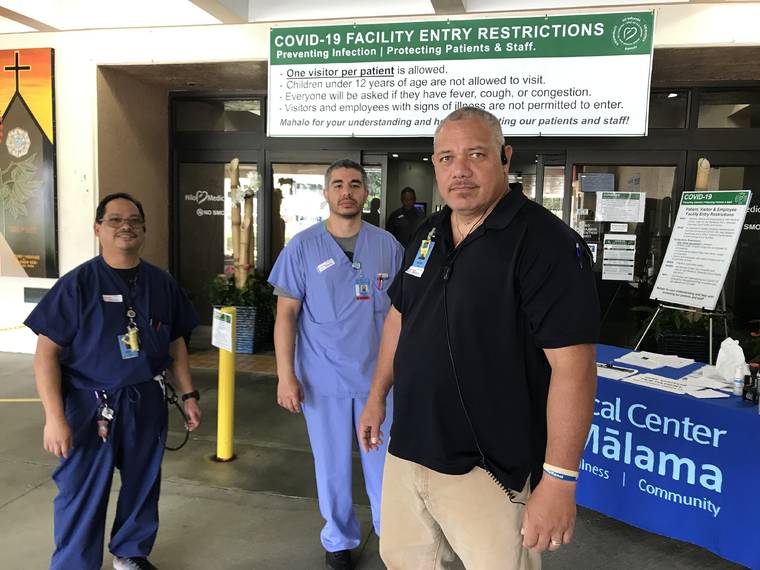New visitor restrictions and screenings are now in place at Hilo Medical Center, Hale Ho‘ola Hamakua, Ka‘u Hospital, Extended Care Facility and HMC’s outpatient clinics in response to ongoing developments with COVID-19.
The new restrictions went into effect Saturday — the day after state health officials confirmed the first positive test for the disease in Hawaii and the day before a second positive test was announced.
First detected in China in late December, COVID-19 has now infected more than 113,000 people around the world and caused more than 4,000 deaths.
East Hawaii Regional Chief Information Officer Kris Wilson said entries to HMC have been restricted to two points — the main lobby and the Emergency Department.
Patients, visitors and employees entering the hospital will be verbally asked about having fever, cough or congestion. Those who have symptoms will have their temperatures taken.
HMC Chief Medical Officer Jon Martell said anyone with a fever of 100.4 degrees or greater will not be allowed into the facility unless they have an appointment at the Hawaii Island Family Health Center.
Those individuals will be given a mask and go directly to the clinic, which is located just inside the hospital’s main entrance.
Additionally, only one visitor at a time is permitted in a patient’s room, and children under 12 are not allowed to visit.
Anyone who exits will have to re-enter from the main entrance or the Emergency Department. A day pass sticker will be provided, but those who don’t have that pass will have to be re-screened.
HMC spokeswoman Elena Cabatu said hospital officials want people to arrange for child care in advance of coming to HMC if possible, and urges the community to consider limiting the amount of people who come.
With only one visitor allowed at a time, Cabatu said that means “a lot of people hanging out outside the main entrance,” which congests the waiting area outside.
She also recommends using technology, like video calling, to reach patients.
“I want to emphasize that we put our screening in place even before we have cases in the community, and (are) now planning next steps,” Martell said. HMC is “diligently working to make sure we stay one step or two steps ahead of the actual situation in our community. We want to be proactive rather than reactive, (which is) why you see this screening up already.”
In West Hawaii, Kona Community Hospital also has restricted visitor access.
Hospital spokeswoman Judy Donovan confirmed Saturday all visitors need to enter through the admissions door, located north of the emergency room entrance, from 8 a.m. to 5 p.m. After 5 p.m. visitors will only be allowed through the emergency room entrance.
A nurse will meet visitors and screen for obvious flu symptoms.
“There are plans in place for COVID, which are the same as for the flu,” said Donovan. “All hospitals (in the state) have been drilling for infectious disease and protocols are in place.”
As of Monday afternoon, Queen’s North Hawaii Community Hospital did not have any visitor restrictions.
Spokeswoman Lynn Scully, however, said the hospital was waiting for Queen’s systemwide guidance, which was expected to be forthcoming later Monday.
For those who may be ill, Martell said, “the recommendation is that if you got a fever or persistent cough, you stay home.”
Individuals should do “whatever symptom relief you need to at home,” and call their primary care provider for instructions, he said.
Martell said those who think they have been exposed can call the state Department of Health.
However, Martell said the DOH is “actively tracking exposures to known cases. If you’ve been exposed to a known case, the DOH is probably already in touch with you.”
Martell said the risk of getting the disease without a known exposure currently is “negligible in our community.”
“We have an emergency room that wants to take care of everybody who truly needs them,” he said. “If too many people come up because they’re not really that sick, but they’re worried, it’s going to jam up the emergency services so the people who really need (it) are going to have difficulty getting the care.”
Those who truly need assessment in the Emergency Department should seek that care, he said.
Testing for COVID-19, however, has to go through the DOH.
Also in response to the ongoing outbreak, Hawaii County recently opened a call center to answer questions about the virus.
The call center can be reached at 935-0031 from 7 a.m.-7 p.m. seven days a week.
Janet Snyder, a spokeswoman for Mayor Harry Kim, said the center is staffed by county employees who are volunteering to do it and getting paid.
The call center workers are given a basic script, but questions that require a more detailed answer are referred to the DOH.
“We get all of our information on the virus itself from the DOH, and they get it from the CDC,” Snyder said. “We do’t (want to) reinvent the wheel. We don’t wing these questions.”
Snyder said the county is offering this service “as a matter of course because people have questions,” and has done the same during eruptions, hurricanes and other events.
The center received 27 calls Sunday and 34 on Monday.
Also on Monday, state House Speaker Scott Saiki announced appointments to the Select House Committee on COVID-19 Economic and Financial Preparedness, which was adopted through a House resolution.
Big Island representatives include state Rep. Richard Onishi and Miles Yoshioka, executive officer for the Hawaii Island Chamber of Commerce.
West Hawaii Today staff contributed to this report.
Email Stephanie Salmons at ssalmons@hawaiitribune-herald.com.






